Top 7 Best Ethereum APIs 2024

Introduction
In the fast-evolving world of blockchain technology, Ethereum remains a leading platform for decentralized applications. Developers seeking to build robust and innovative dApps need reliable tools that can interface effectively with the Ethereum network. APIs play a crucial role in this ecosystem, offering the necessary bridge between blockchain infrastructure and developer applications. As we look ahead to 2024, identifying the top-performing Ethereum APIs becomes essential for any serious developer aiming to optimize their projects. This article aims to provide a clear overview of the seven best Ethereum APIs available in 2024, evaluating their performance, ease of use, and unique features to help you choose the right tools for your development needs.
API Selection Criteria
Choosing the right Ethereum API can significantly impact the success of your development projects. Here are the key criteria we considered when evaluating the top APIs for Ethereum in 2024:
- Performance and Reliability: An API must offer high uptime and consistent response times to ensure that applications perform efficiently under various conditions. We assessed each API's ability to handle high transaction volumes and its resilience against network disruptions.
- Ease of Integration and Documentation: A well-documented API with clear, comprehensive guides and support materials can drastically reduce development time and improve ease of use. We looked for APIs that provide thorough documentation, SDKs, and active developer communities to facilitate smoother integration.
- Customer Support and User Community: Reliable customer support can be invaluable, especially when dealing with complex issues. APIs backed by a responsive support team and a vibrant community can provide additional resources and collective knowledge, enhancing the developer experience.
These criteria guided our selection of the top Ethereum APIs, ensuring that each recommended tool meets high standards of quality and usability.
Mobula API
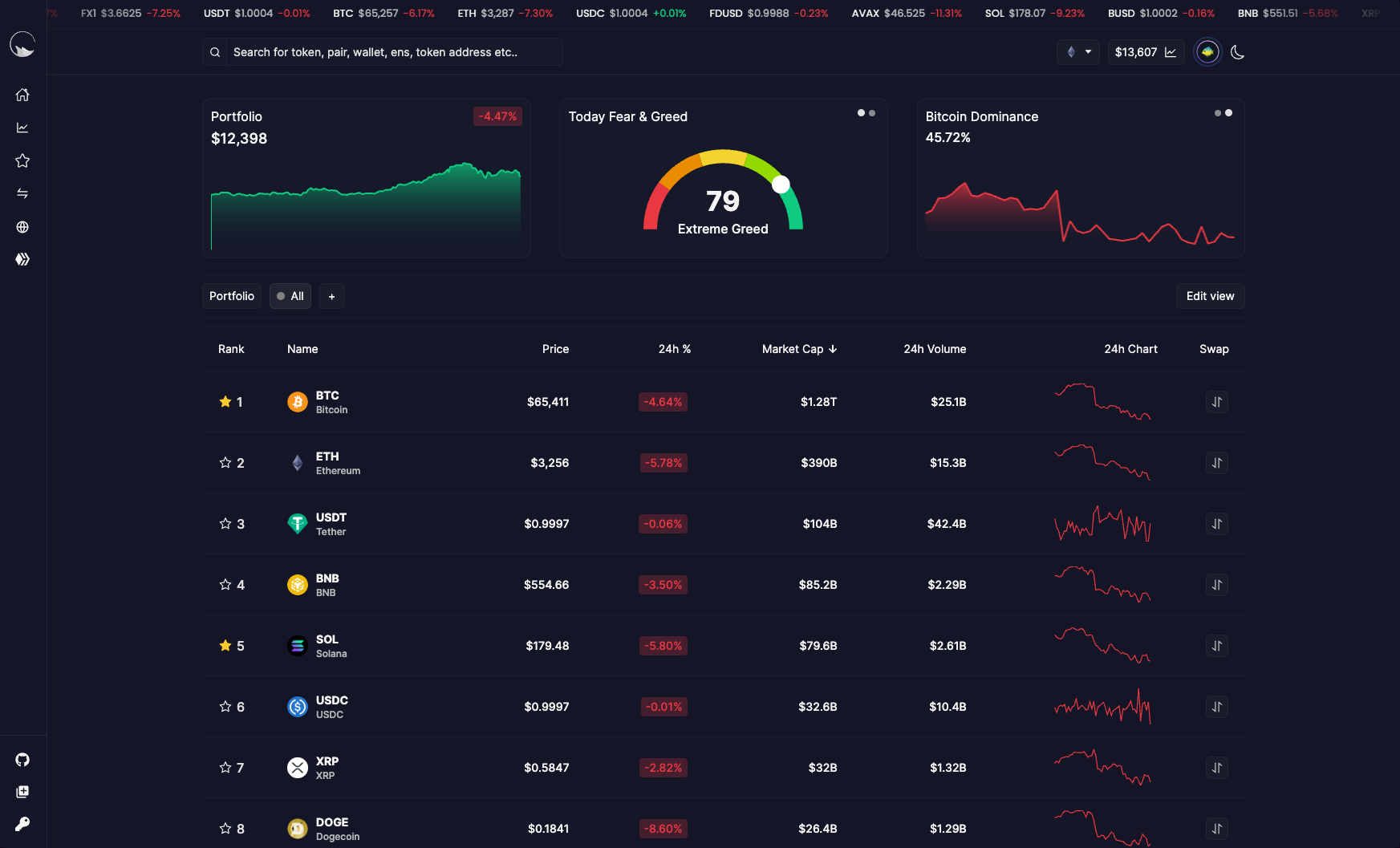
- General Description:
Mobula API stands out as a comprehensive data aggregator in the Ethereum ecosystem, providing developers with extensive access to market data, wallet data, pair data, and metadata. This API is designed to enhance applications by integrating diverse data streams that offer real-time insights and analytics, making it a crucial tool for developers looking to build sophisticated, data-driven dApps. - Key Strengths:
- Comprehensive Data Coverage: Mobula API offers an all-encompassing range of data types. From detailed market dynamics to individual wallet interactions and trading pair statistics, developers have a wealth of information at their fingertips.
- Real-Time Data Access: With Mobula API, the data is not only comprehensive but also delivered in real-time, allowing developers to make timely and informed decisions based on the latest market conditions.
- Enhanced Metadata Handling: The API provides rich metadata insights, which are essential for understanding the broader context of wallet transactions and market changes.
- Usage Examples:
- Market Trend Analysis: Developers can use Mobula API to fetch real-time market data to analyze trends and predict future movements in the Ethereum market.
- Wallet Monitoring: The API can be used to monitor wallet activities, providing developers with the tools to build features like transaction alerts or portfolio management systems.
- Pair Data Utilization: Access to real-time pair data allows for applications to integrate features like trading pair analytics, enhancing user engagement with actionable insights.
Mobula API provides a robust platform for Ethereum developers aiming to integrate detailed and diverse blockchain data into their applications, supporting a wide range of functionalities from market analysis to personalized wallet tracking.
Start using the API by registering on the Mobula API dashboard.
Infura
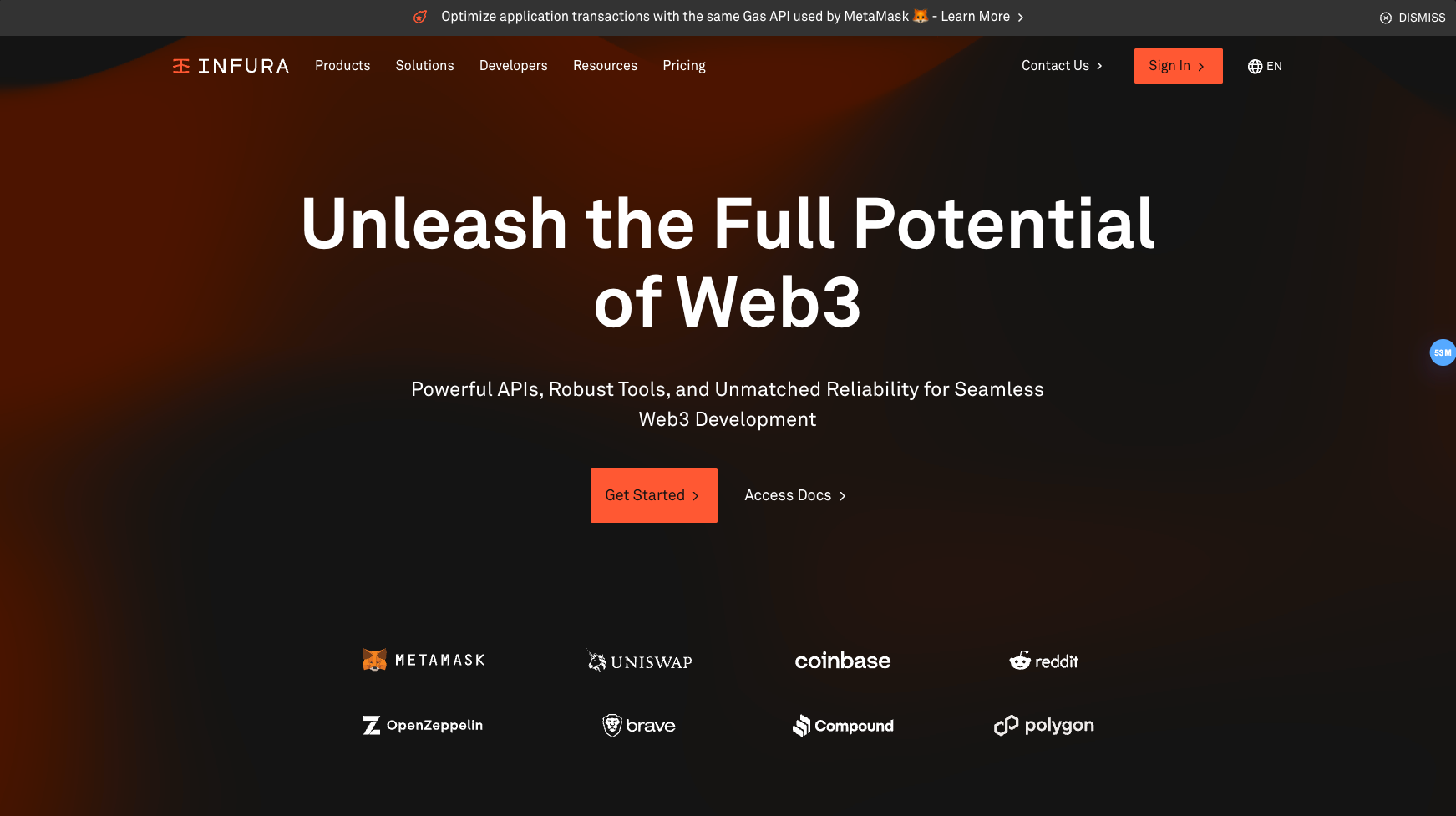
- General Description:
Infura is a powerful Ethereum API that offers developers seamless access to the Ethereum network without the need to run their own nodes. It provides scalable, reliable, and easy-to-use access to Ethereum and IPFS networks, making it a critical tool for developers seeking efficient and effective blockchain integration. - Key Strengths:
- Scalability: Infura is built to handle high demand and large-scale applications, ensuring that developers can scale their applications without worrying about the underlying infrastructure.
- Reliability: With its robust infrastructure and uptime guarantees, Infura provides developers with the confidence that their applications will remain operational, even during high network congestion.
- Ease of Use: Infura simplifies the complexity of blockchain communication by providing straightforward, well-documented APIs that are easy to implement, reducing the barrier to entry for new developers.
- Usage Examples:
- Decentralized Application (dApp) Deployment: Developers can deploy and manage their dApps easily, leveraging Infura's robust network to ensure smooth operations.
- Smart Contract Interaction: Infura allows developers to interact with smart contracts on the Ethereum blockchain, facilitating functions such as deploying, querying, and invoking contract methods.
- Real-Time Event Listening: The API supports real-time event listening, which is crucial for dApps that need to respond instantly to blockchain events like transactions or smart contract executions.
Infura’s API provides a vital service for developers by abstracting away the complexities of direct blockchain interaction, allowing them to focus more on the functionality and user experience of their Ethereum-based applications.
Alchemy
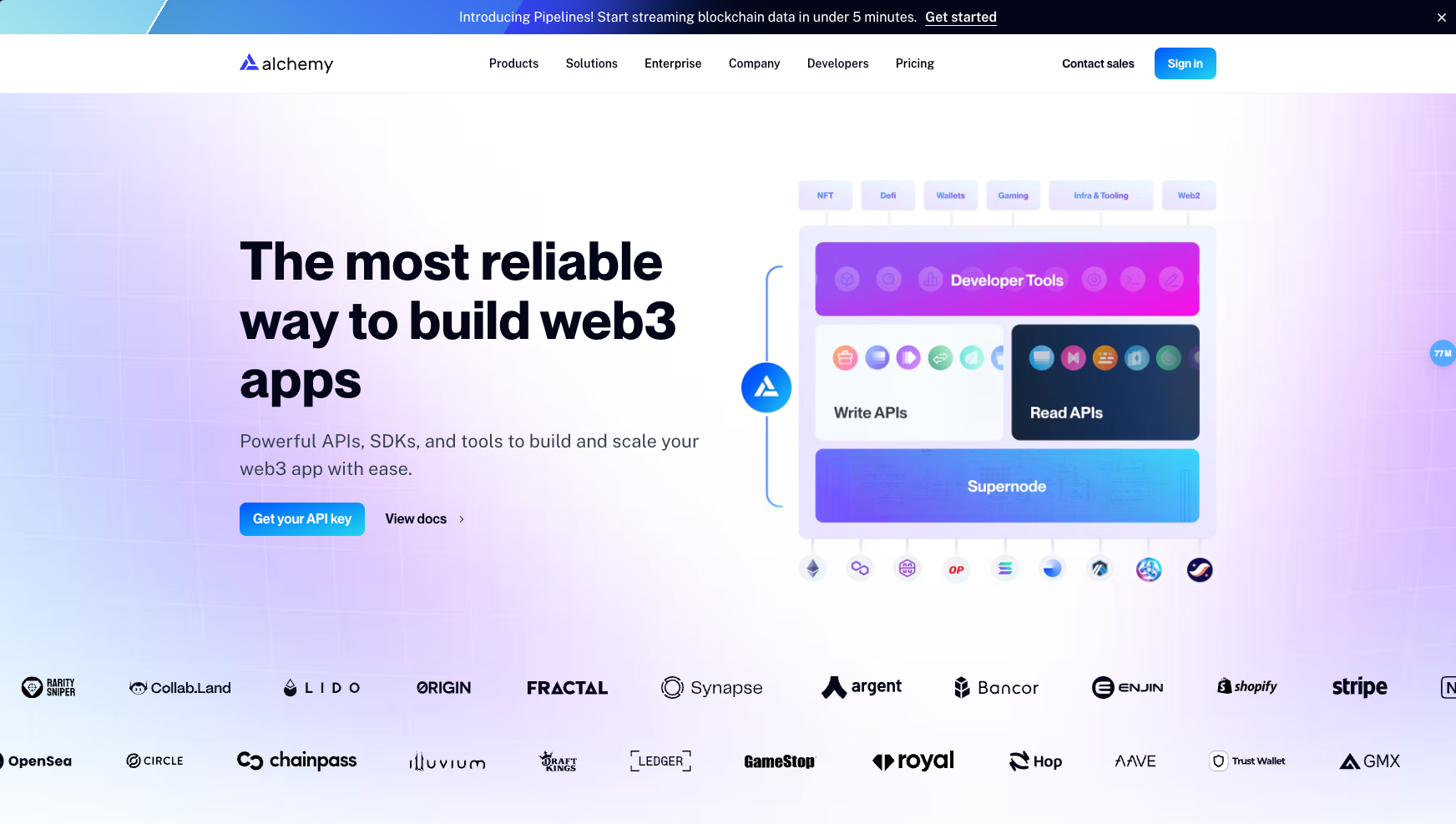
- General Description:
Alchemy is a highly capable Ethereum API that provides developers with the tools they need to build, scale, and operate blockchain applications more efficiently. By offering a suite of developer tools that enhance and simplify the blockchain development process, Alchemy powers millions of users and billions of blockchain queries. - Key Strengths:
- Developer Tools and Enhancements: Alchemy includes features such as enhanced APIs, real-time analytics, and debugging tools that not only streamline development processes but also improve the performance and reliability of blockchain applications.
- Scalable Infrastructure: Alchemy's infrastructure is designed for scalability, supporting small projects and large enterprises alike with the same level of reliability and speed.
- Network Insights: Provides developers with deep insights into blockchain network conditions, helping them optimize their applications for better performance and lower costs.
- Usage Examples:
- Application Development and Management: Developers can utilize Alchemy to develop and manage their applications more efficiently, with access to extensive analytics and management tools that help monitor application health and usage.
- Blockchain Data Access: Alchemy enables access to historical and real-time blockchain data, aiding in comprehensive data analysis and reporting.
- Smart Contract Deployment and Interaction: It facilitates seamless deployment and interaction with smart contracts, making it easier for developers to integrate complex blockchain functionalities into their applications.
Alchemy's comprehensive tools and scalable infrastructure make it an indispensable API for developers looking to leverage Ethereum technology to its fullest potential, enabling them to create innovative and efficient applications on the blockchain.
EtherScan
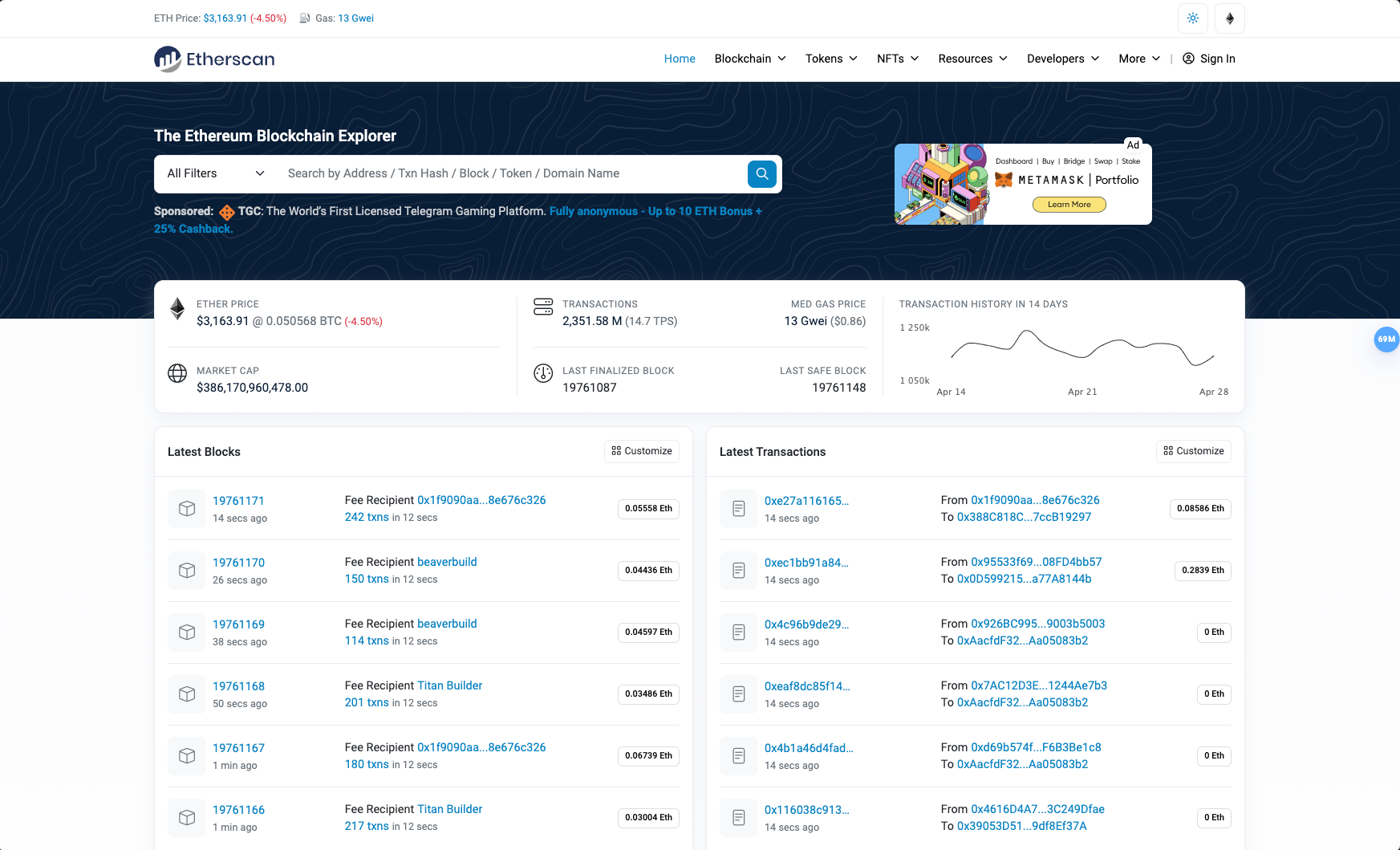
- General Description:
EtherScan is a widely recognized Block Explorer and Analytics Platform for Ethereum, providing a comprehensive view of the Ethereum blockchain. It is essential for developers who need detailed and accessible information about blockchain transactions, blocks, and smart contracts. - Key Strengths:
- In-depth Blockchain Analytics: EtherScan offers extensive tools for analyzing the Ethereum blockchain, including visualizations of transactions and smart contracts, making it invaluable for developers seeking to understand blockchain dynamics deeply.
- API Services: EtherScan’s API services enable developers to retrieve data such as transaction histories, wallet balances, and contract interactions directly, facilitating a deeper integration with their own applications.
- Real-time Data: The platform provides real-time data, ensuring that developers and users have the most current information available for decision-making and analysis.
- Usage Examples:
- Transaction Tracking: Developers can use EtherScan’s API to track transaction statuses and histories, crucial for applications requiring confirmation of blockchain activities.
- Wallet Monitoring: By leveraging the API, developers can implement features in their applications that monitor Ethereum wallet balances and transactions in real time.
- Smart Contract Audits: EtherScan is an essential tool for developers performing audits on smart contracts, as it provides detailed insights into contract deployments and interactions.
EtherScan is not just a tool for viewing Ethereum blockchain information but an expansive platform that supports developers in building more transparent, efficient, and user-friendly blockchain applications.
Web3.js
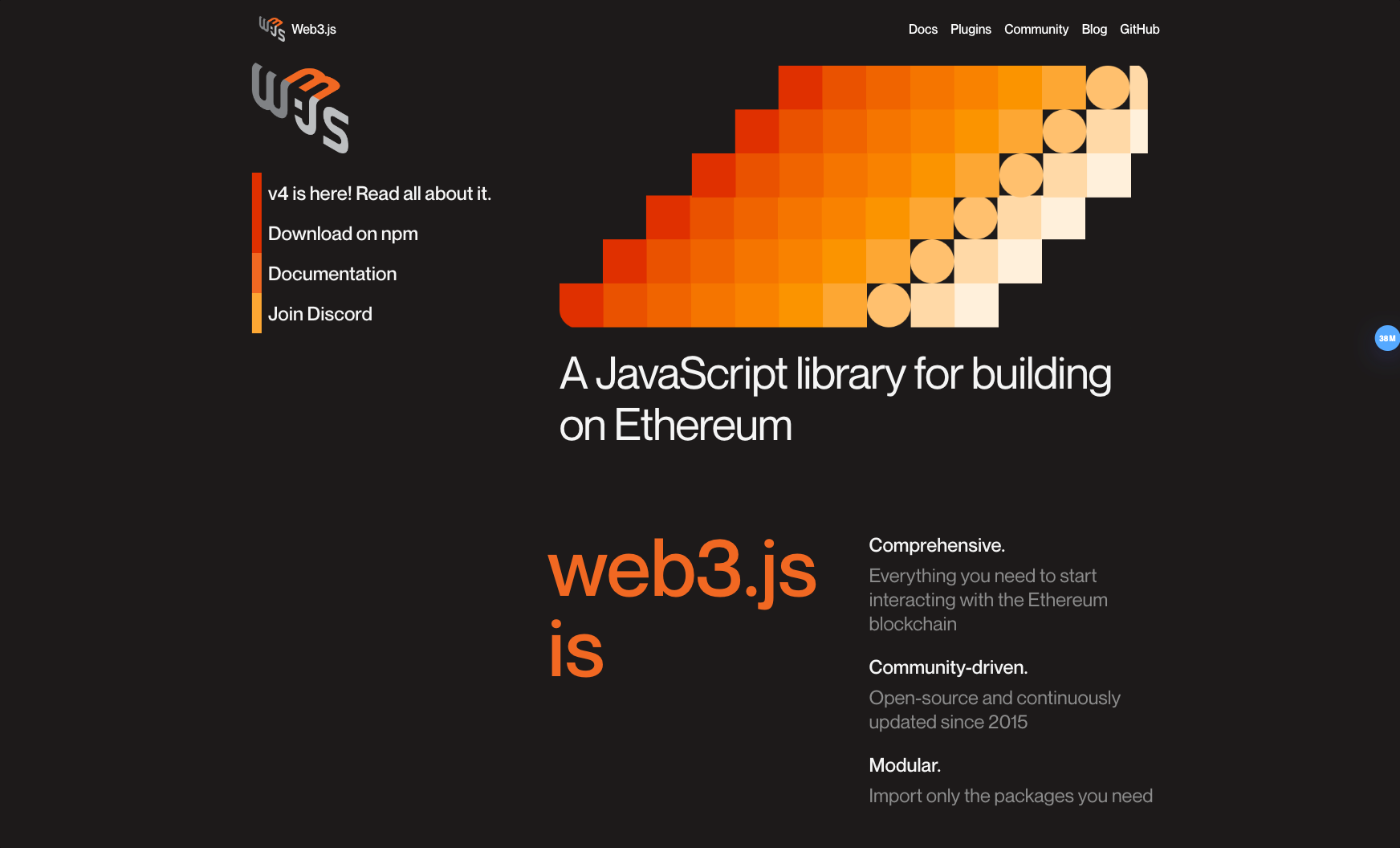
- General Description:
Web3.js is a collection of libraries that allow you to interact with a local or remote Ethereum node, using an HTTP or IPC connection. It is the go-to framework for developers building applications that need to interact directly with the Ethereum blockchain. - Key Strengths:
- Comprehensive Library Support: Web3.js provides a robust set of JavaScript libraries, enabling developers to perform a wide range of actions such as sending transactions, interacting with smart contracts, and accessing blockchain data.
- Ease of Integration: Designed with simplicity in mind, Web3.js can be easily integrated into any web application, allowing developers to build feature-rich dApps that operate smoothly with Ethereum’s blockchain.
- Community and Documentation: Supported by a large and active developer community, Web3.js offers extensive documentation and community resources, making it easier for new developers to get started and for existing developers to solve complex issues.
- Usage Examples:
- DApp Development: Developers can use Web3.js to create decentralized applications (dApps) by integrating blockchain interactions directly into web interfaces.
- Smart Contract Interaction: It simplifies interacting with smart contracts, allowing developers to deploy, call methods, and listen for events in smart contracts directly from JavaScript.
- Wallet Integration: Web3.js can manage user Ethereum accounts and facilitate transactions, making it ideal for applications that require direct wallet integration.
Web3.js is a fundamental tool in the Ethereum development ecosystem, providing the necessary functionalities to bridge web applications with the Ethereum blockchain, thus enabling the creation of decentralized, client-side applications.
MetaMask
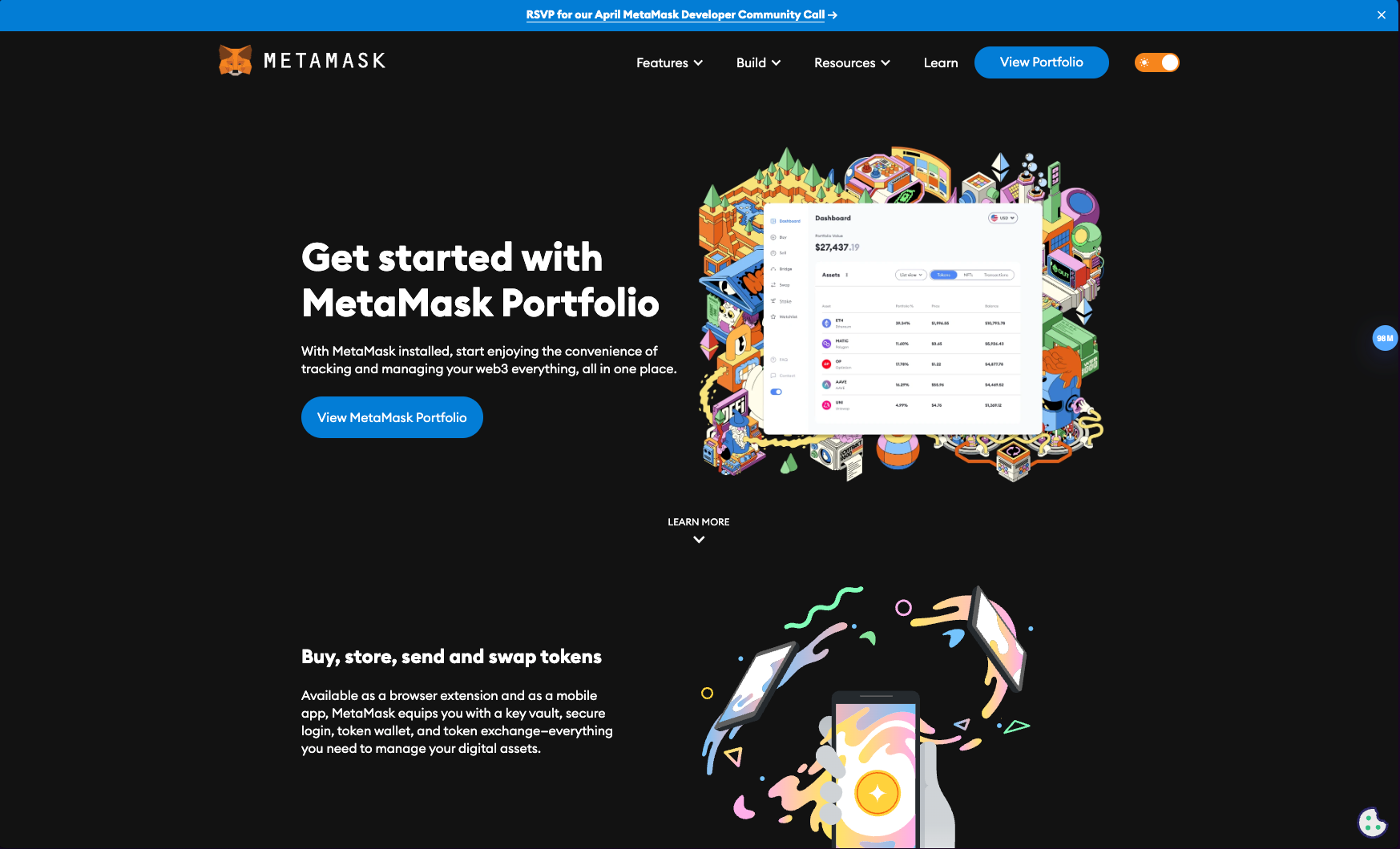
- General Description:
MetaMask is not just a popular Ethereum wallet; it also provides a powerful API that enables developers to integrate Ethereum blockchain interactions seamlessly into their applications. It acts as a bridge between web browsers and the Ethereum blockchain, facilitating user interactions with dApps without needing to run a full Ethereum node. - Key Strengths:
- User-Friendly Interface: MetaMask offers a user-friendly interface that simplifies the process of managing digital identities and enables users to manage their wallets and connect to dApps easily.
- Secure Identity Management: The API provides robust security features that handle identity management, allowing users to sign blockchain transactions and personal messages securely without exposing their private keys.
- Wide Adoption: As one of the most widely adopted Ethereum interfaces, MetaMask facilitates a large ecosystem of users and developers, providing extensive support and compatibility with numerous dApps.
- Usage Examples:
- DApp Connectivity: Developers can use MetaMask’s API to connect their web applications to the Ethereum blockchain, enabling users to interact with dApps directly from their browsers.
- Transaction Management: The API allows applications to initiate and manage blockchain transactions, offering users a smooth and secure way to engage with digital assets and smart contracts.
- Identity Verification: By integrating MetaMask, applications can leverage its secure login features for blockchain-based identity verification processes.
MetaMask’s API is a crucial tool for any developer looking to foster user interaction with Ethereum-based dApps. Its ability to manage secure identities and facilitate easy access to the blockchain makes it indispensable for enhancing the user experience in the decentralized web space.
Chainlink
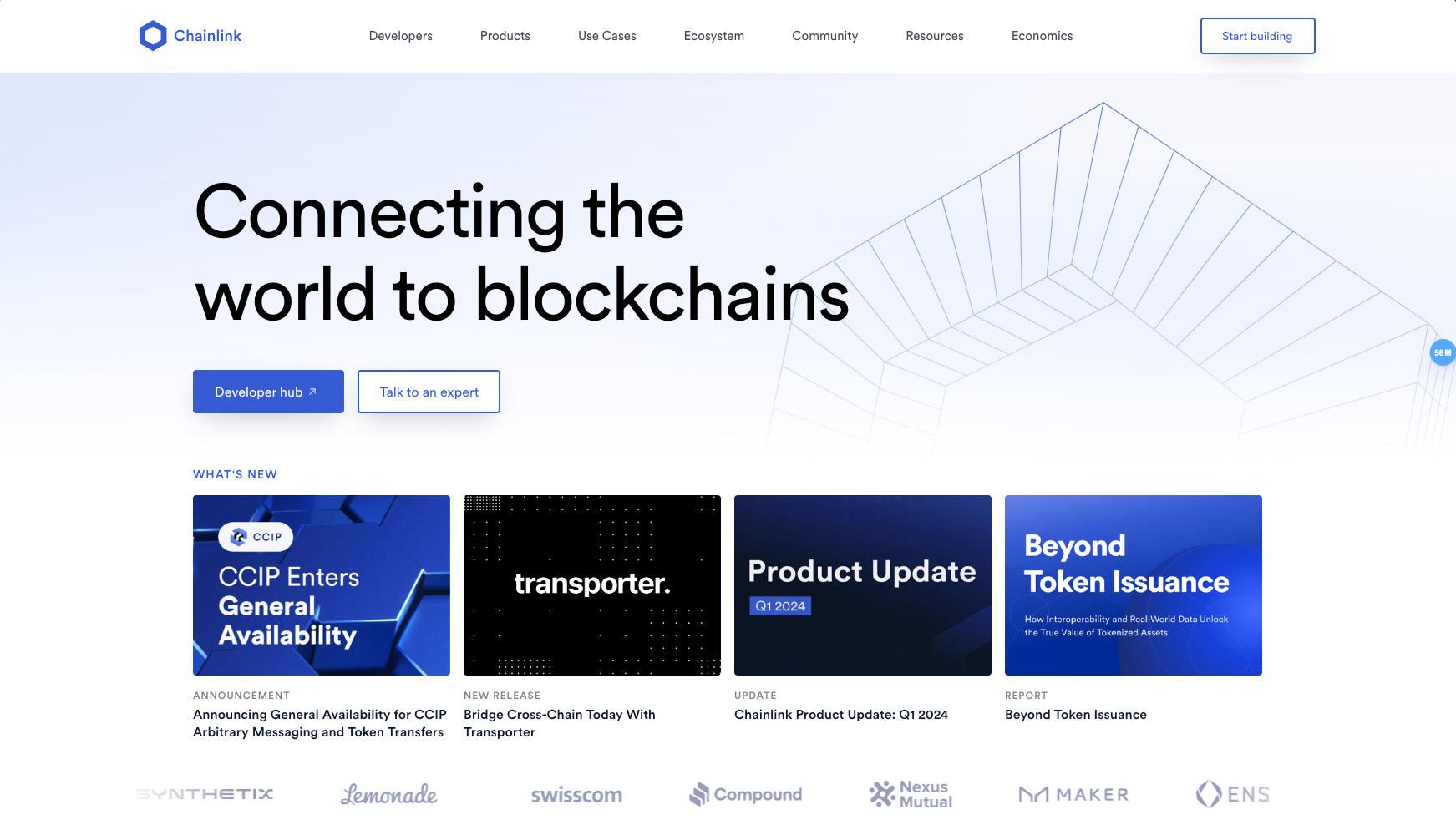
- General Description:
Chainlink is a decentralized oracle network that provides reliable, tamper-proof inputs and outputs for complex smart contracts on any blockchain. It extends the capabilities of smart contracts by enabling access to real-world data and off-chain computation while maintaining the security and reliability expected of blockchain technology. - Key Strengths:
- Real-World Data Integration: Chainlink allows Ethereum smart contracts to securely interact with external data feeds, events, and payment methods, providing the critical off-chain information needed for many contractual agreements.
- Decentralized Network: The use of a decentralized oracle network ensures that the data Chainlink provides is both secure and resistant to manipulation, essential for maintaining trust in decentralized applications.
- Flexibility and Adaptability: Chainlink is designed to be blockchain-agnostic, making it versatile and adaptable for various use cases across different blockchain environments.
- Usage Examples:
- Financial Applications: Developers can integrate Chainlink to provide real-time price feeds for cryptocurrencies or traditional financial assets, crucial for financial dApps requiring high reliability and accuracy.
- Event-Driven Smart Contracts: Chainlink can be used to trigger smart contracts upon the occurrence of specific real-world events, such as sports results, weather conditions, or stock market movements.
- Secure Payments: The API enables smart contracts to execute transactions based on verified external payments, bridging the gap between traditional financial systems and blockchain-based applications.
Chainlink's ability to securely and reliably bring external data into the Ethereum ecosystem makes it a cornerstone technology for developers aiming to build sophisticated, responsive, and truly integrated decentralized applications.
Comparison and Conclusion
After reviewing some of the top Ethereum APIs available, we have prepared a comparative table to summarize their key features and strengths. This table aids in assessing which API best suits specific project needs.
| API Name | Key Features | Strengths |
|---|---|---|
| Mobula API | Market, wallet, pair, metadata access | Comprehensive data, real-time updates |
| Infura | Access to Ethereum and IPFS networks | Scalability, high reliability, ease of use |
| Alchemy | Developer tools, scalable infrastructure | Extensive analytics, simplified blockchain interaction |
| EtherScan | Blockchain analytics platform | Detailed insights, real-time data |
| Web3.js | JavaScript library for Ethereum | Comprehensive library support, ease of integration |
| MetaMask | Wallet interaction and security | User-friendly, secure identity management |
| Chainlink | Decentralized oracle network | Real-world data integration, decentralized security |
Final Recommendations:
- For Comprehensive Data Solutions: Mobula API is highly recommended for its robust data access and real-time updates, making it an excellent choice for projects that require a broad range of blockchain data.
- For Large-Scale Applications: Infura and Alchemy offer scalability and robust infrastructure suitable for high-demand environments.
- For Real-Time Data and Analytics: EtherScan and Chainlink excel in providing deep insights and integrating real-world data into blockchain applications.
- For Developing User-Friendly dApps: MetaMask and Web3.js stand out for creating applications with strong user interfaces and straightforward blockchain interaction.
Ultimately, the selection of an Ethereum API should align with the specific demands and objectives of your project, factoring in considerations such as ease of use, data needs, security, or scalability. Each API discussed provides distinct advantages that can significantly enhance the functionality and user experience of your application in the evolving landscape of Ethereum development.
As we continue to explore and expand the possibilities within the Ethereum ecosystem, the importance of choosing the right API cannot be overstated. Each API we've discussed offers unique capabilities that can significantly enhance your application's effectiveness and efficiency in the blockchain space.
We encourage you to delve into these tools, experiment with their features, and determine which API best meets the specific needs of your project. Start integrating these powerful tools today to unlock new potentials for your applications, optimize your development processes, and push the boundaries of what you can achieve on the Ethereum platform.
Don't hesitate to reach out to the providers for more detailed information and support as you embark on your development journey. Remember, the right tools are key to leveraging the full power of Ethereum, driving innovation, and achieving success in your blockchain initiatives.
References
To further your understanding and enhance your development strategies, the following resources can provide additional information about the Ethereum APIs discussed in this article. These references include official documentation, community discussions, and technical guides, which are invaluable for developers looking to deepen their knowledge and refine their skills:
- Mobula API - Official Documentation
- Infura - API Documentation
- Alchemy - Developper Hub
- EtherScan - API Documentation
- Web3.js - GitHub Repository
- MetaMask - Developers Section
- Chainlink - Developer Resources
Leveraging these resources will enable you to better understand each API's capabilities and how they can be applied to your projects. We encourage you to explore these materials and engage with the respective developer communities to stay updated on the latest advancements and best practices within the Ethereum ecosystem.




